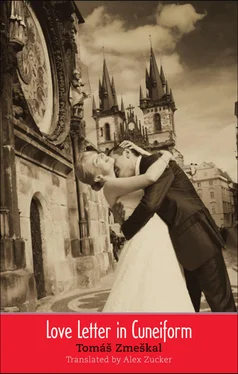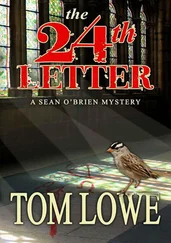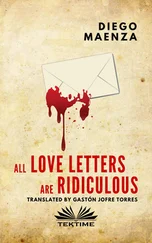He was right. Only under the harsh light of the kitchen bulb did it become clear that the mess of human arms, breasts, feet, and head had all been perfectly sculpted from marzipan and other ingredients. The realism of even the tiniest detail was stunning, some of them even said terrifying. For instance, the hairs on the left arm were created from tinted caramel fibers. There was a birthmark on the forearm, and the ankle of the left leg had a little lizard tattooed on it and a strip with Indian motifs. The most remarkable thing of all, though, was the woman’s head. It was wrapped in a scarf with thick black hair poking out from underneath. Her lips were curled into a smile and her eyes looked straight at you. Shining and alive, the only thing they didn’t do was blink. The officers walked awkwardly around the kitchen, unsure what procedure to use in this situation. Just then, the deputy chief of the local precinct walked into the room.
“Good god,” he said as he opened the door and stopped in his tracks. “So it’s true. We’ve got a maniac here.” Then he noticed the three faces looking at him and caught sight of the fourth member of the crew, who hadn’t yet noticed his arrival and was absorbed in licking a human hand.
“You must be out of your mind,” crowed the deputy chief. “You’re suspended effective immediately.” At which point the officers standing in the middle of the kitchen snapped back to their senses and started explaining to the deputy chief that what he saw was just an illusion. He wasn’t seeing what he saw; he only thought he saw what he was seeing. We don’t see; we expect, thereby filling our lives with undue disappointment; in short, it’s all just one great big confection. Given this explanation, after a thorough search of the apartment failed to unearth anything out of the ordinary, apart from the lock the thief pried open, the presence of the police was left groundless and unjustifiable. Inhabitant of the apartment detained, thief in hospital, theft unreported, dead body absent.
“So what do we do now?” one of the officers asked. “There isn’t anything here, so there’s really nothing we can do.”
That thought had occurred to the deputy chief a while ago, but he was hoping either they would turn something up or the chief himself would put in an appearance. He reached a decision.
“I want everything photographed. Call off CSI or we’ll be the laughingstock of the precinct. Secure the premises temporarily and clear the hell out.” As he left, he peeked into the kitchen for one last look at the marzipan breasts, the tattooed ankle, and especially the woman’s head, the pupils of her eyes fixed on whoever happened to step through the door.
“That is one fine-looking woman,” he said. But even before the last word was out of his mouth, he knew he shouldn’t have said it. It was somehow … inappropriate. The whole thing was inappropriate somehow.
The pastry chef’s name was Marek Svoboda. Medium build, average height, hair vague in color, manners unremarkable if pleasant. The kind of man who was difficult to remember. This indefinable fuzziness, however, disappeared the moment he spoke. For one thing, he didn’t act naturally, the precinct chief observed. Anyone else in his place would have been intimidated at first, and then angry. Anyone else, after the police broke into his apartment, slammed him to the ground, handcuffed him, and locked him in a preliminary detention cell, would have wanted a lawyer, asked to file a complaint, demanded a written or verbal apology. Not him. He just smiled when they removed the handcuffs and said he didn’t hold it against his brother policemen. They were all just brothers in suffering, he said. Calling them brother wasn’t a violation or an offense, or anything else they could keep him in custody for. Nevertheless, the precinct chief knew the pastry chef wasn’t normal, and there was something fishy about it. When he asked him why he had decided to make a woman out of candy, he said because his wife had left. When he asked why he hadn’t reported his wife as missing, he said he didn’t miss her because she had left with someone or left him for someone else. When he asked whether he could see her farewell letter, the pastry chef just sighed and said he couldn’t because he had eaten it. When he asked him why he had eaten it, the pastry chef said he wanted to have at least part of his wife inside him. When asked whether he had killed her and wanted to admit to it, the pastry chef just grinned and said he hadn’t killed his wife, he loved her, and asked the chief whether he had committed any crime that he should confess to. And that was the problem the chief of the precinct was now trying to solve. The man was definitely not all right. His wife had either left him for her lover or run away with him, but either way she was missing. He was making a version of her out of marzipan and calling everyone brother. None of which was a violation or a criminal offense. But then the chief got an idea. There was a law that said that a person who was a danger to himself could — even against his will — be committed to an insane asylum. Usually it was applied in cases of suicide, but why not this weirdo?
When the doctor heard the story of pastry chef Marek Svoboda, as reconstructed for him from the notebook of the policeman who had brought him to the psychiatric hospital, he wasn’t pleased in the least. Peculiar behavior wasn’t enough to have a man institutionalized against his will. Certainly, he said, the officer could understand that. If it were, they’d have to lock up half the people in the city. It didn’t appear to be mental illness so much as what’s known as a borderline case, somewhere in between a disorder and harmless eccentricity. The policeman was unhappy. They didn’t have anything on the guy, which meant not only they’d have to let him go, but also they’d have to apologize, and of course he was the one who’d failed to get him into the nuthouse. The conversation wasn’t moving in a promising direction. As the doctor rummaged around in a drawer, trying to find the intake forms, the officer, grasping at one last chance, interrupted him.
“Pardon me, Doctor,” he began, “but the chief told me the person he spoke to said Mr. Svoboda had been here for treatment before. Is that true?”
“Yes, it is,” the doctor replied.
“And what was he in for?” the officer asked.
“That’s confidential,” the doctor said. “I’m sure you understand that I can’t tell you.”
“All right.” The policeman decided to try a different tack. “Could you go ahead and take a look at him anyway? He really is acting strange.”
The doctor slid shut the drawer he had been searching in vain for the intake forms, and nodded. It was starting to get light.
Pastry chef Marek Svoboda sat in a chair across from the doctor looking calm and focused.
“Hello, Mr. Svoboda, or should I say good morning?” the doctor said. “I’m Doctor Lukavský. It seems you had a busy night.”
The pastry chef gazed back at him, but didn’t seem inclined to respond.
“Well, Mr. Svoboda, the police think your behavior isn’t entirely typical and that I should evaluate you in light of what happened last night. What do you think about that?”
The pastry chef didn’t answer, staring at the branches swaying outside the window. He seemed to be mulling it over.
“Do you think the police have the right?”
The pastry chef smiled faintly and stared straight at the doctor. “My name isn’t Svoboda.”
“Pardon me,” the doctor said. “I must have missed something. It says here: Marek Svoboda. Profession: pastry chef.”
“That was my name,” the pastry chef said. “That’s what it used to be.”
“Aha,” the doctor said. “Then what is your name now? So I’ll have my records straight.”
Читать дальше












